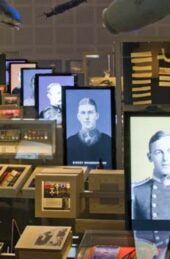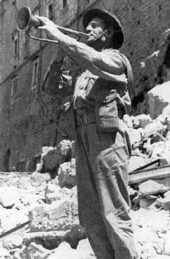I can still recall my growing sense of discovery at the British Library one morning when I found a story my Dad told us as kids appearing in every single national newspaper I searched – the fusty Times excepted. I learned that one night in September 1943 an “entire company” of American soldiers had calmly returned to their Cornish camp, armed themselves and marched in formation to confront the despised “snowdrops” of the 29th Infantry Division who policed them. The ensuing firefight in town sent soldiers who would later face Omaha beach sprawling for cover, leading one elderly Cornishman to tell the Daily Mirror: “There hasn’t been anything here like this since the days of the smugglers.” The Cornish mutiny captured the tabloid imagination and reporters happily dressed their copy in Hollywood-style cowboy and gangster imagery which was reproduced in newspapers from Cornwall to Dundee. When, three weeks later, 14 accused members of the 581st Ordnance Ammunition Company stepped into a Paignton police court – transformed with enormous stars and stripes and some nifty rearranging of furniture into an American military courtroom – it was front page news. Nobody had died – just two MPs were hospitalised with leg injuries, but it was a case that caused Churchill “grave anxiety” and was potentially so damaging to Anglo American relations that officials airbrushed the verdict. Why?
 African American troops, Bodmin Barracks, 1944
African American troops, Bodmin Barracks, 1944
The clue, I discovered that day in the British Library, was a single detail critical to story’s x-factor, cover-up and continued relevance today: the mutineers ethnicity. The mutiny was committed by African American soldiers in a US Army segregated by race and it came to epitomise the officially unacknowledged racial tension that was exploding with increasing violence all over Britain – to the bewilderment of civilian bystanders. Thanks to a lucky freedom of information request 15 years ago and more recent research in British and American archives, I was able to put the story back together and into its historical context. Along the way, fascinating characters such as George Orwell, the NAACP’s Walter White, journalist Roi Ottley and cricketing legend Learie Constantine have stepped out from the shadows to reveal a forgotten but crucial strand of Second World War history. An American Uprising in Second World War England: Mutiny in the Duchy explains what happened that night in the Norman town of Launceston – and an intriguing wider story of how everyday British people reacted against imported American racial violence with a near uniformity that put the “special relationship” itself under great strain before D-Day.
It was why the judge first tried to ban reporters from mentioning race altogether and then, having failed, refused to announce the verdict that his army panel had reached. This meant the African American soldiers who mutinied one night in Cornwall, and whose plight briefly flickered nationally and internationally in 1943, became an obscure and mysterious footnote in the history of Great Britain’s “American Occupation”. The lost and now found story must be remembered nearly 80 years on not least because their lives mattered too.
An American Uprising in Second World War England: Mutiny in the Duchy by Kate Werran is out now.






